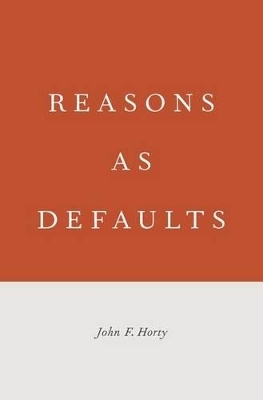
Reasons as Defaults
Oxford University Press Inc (Verlag)
978-0-19-974407-7 (ISBN)
- Titel ist leider vergriffen;
keine Neuauflage - Artikel merken
This book joins an important and active literature, but it also occupies a unique position. Most of the current work on reasons is concerned with a number of complex philosophical issues, such as, for example, the relation between reasons and motivation, desires, and values, the issue of internalism versus externalism in the theory of reasons, and the issue of objectivity versus subjectivity of reasons. Horty's book, by contrast, concentrates on developing a concrete theory of the way in which reasons might interact to support their outcomes. He brings to the study of reasons and their outcomes the same standards of rigor that Frege first applied in studying the relation between ordinary logical premises and their conclusions.
John Horty is Professor of Philosophy, University of Maryland. He is the author of Agency and Deontic Logic and Frege on Definitions.
Introduction ; I Default logic ; 1 A Primer on Default Logic ; 1.1 Basic concepts ; 1.1.1 Default rules ; 1.1.2 Priority relations ; 1.1.3 Theories and scenarios ; 1.2 Central definitions ; 1.2.1 Binding defaults ; 1.2.2 Proper scenarios and extensions ; 1.3 Extensions and conclusions ; 1.3.1 Theories with multiple extensions ; 1.3.2 Theories without extensions ; 2 From Defaults to Reasons ; 2.1 An austere theory of reasons ; 2.2 Developing the theory ; 2.2.1 Conflict, strength, and defeat ; 2.2.2 Reasons and enablers ; 2.2.3 Reason amalgamation ; II Deontic Logic ; 3 Reasons and Oughts ; 3.1 The two logics ; 3.1.1 Simple oughts ; 3.1.2 Conditional oughts ; 3.1.3 Some history ; 3.2 Properties of the logics ; 4 Moral Conflicts ; 4.1 Logical objections ; 4.1.1 Agglomeration ; 4.1.2 Other logical objections ; 4.2 Conceptual objections ; 4.3 Objections based on reasons as moral forces ; III Some Elaborations ; 5 Variable Priorities and Exclusion ; 5.1 Variable priority default theories ; 5.1.1 The definition ; 5.1.2 Some examples ; 5.2 Exclusionary default theories ; 5.2.1 The definition ; 5.2.2 Some examples ; 5.3 Discussion ; 5.3.1 Downward closure of exclusion ; 5.3.2 Exclusion by weaker defaults ; 5.3.3 Excluders, intensifiers, and attenuators ; 6 Particularism ; 6.1 Dancy's argument ; 6.2 Evaluating the argument ; 6.3 Discussion ; 6.3.1 Pragmatic considerations ; 6.3.2 Borrowing a book ; 6.3.3 Moderate particularism ; IV Some complications ; 7 Skepticism and Floating Conclusions ; 7.1 Floating conclusions ; 7.1.1 Arguments and paths ; 7.1.2 Two versions of skepticism ; 7.2 The problem with floating conclusions ; 7.2.1 An example ; 7.2.2 Objections to the example ; 7.3 Discussion ; 7.3.1 Other examples ; 7.3.2 Skepticism ; 8 Problems with Priorities ; 8.1 Refining the concept of defeat ; 8.2 Controlling the order of application ; 8.3 Discussion ; 8.3.1 Inappropriate equilibria ; 8.3.2 Other orderings ; 8.3.3 Reinstatement ; V Appendices ; A Notes on the default logics ; A.1 Proper scenarios ; A.2 Some observations on defeat ; A.3 Normal default theories ; B Notes on the deontic logics ; B.1 A comparison with van Fraassen's logic ; B.2 A comparison with standard deontic logic
| Erscheint lt. Verlag | 24.5.2012 |
|---|---|
| Verlagsort | New York |
| Sprache | englisch |
| Maße | 164 x 236 mm |
| Gewicht | 494 g |
| Themenwelt | Geisteswissenschaften ► Philosophie ► Ethik |
| Geisteswissenschaften ► Philosophie ► Logik | |
| Geisteswissenschaften ► Philosophie ► Philosophie des Mittelalters | |
| ISBN-10 | 0-19-974407-6 / 0199744076 |
| ISBN-13 | 978-0-19-974407-7 / 9780199744077 |
| Zustand | Neuware |
| Haben Sie eine Frage zum Produkt? |
aus dem Bereich


